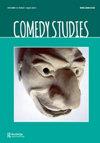The mechanics of spontaneous comedy: game verses scene in theatrical improvisation
Q1 Arts and Humanities
引用次数: 0
Abstract
Abstract Much of improvised comedy’s appeal comes from the shared acknowledgement between performer and audience that the material is both spontaneous and unrepeatable. But can ‘anything’ really happen? In the many and varied approaches of Short and Long-Form improvisation are performance structures which inform both the unprepared scenic material and the types of humour which can be produced. Some have argued that the evolution of Long-Form began with the abandonment of game in favour of relational scene. This helpful distinction warrants further discussion; especially since the practice of ‘finding the game’, popularised by the Upright Citizens Brigade (2013), has blurred the boundary between game and scene. How do such scenic games function within these structures? How do they relate to other notions of game and scene to be found in the performance practice of other improvised traditions? I will explore the paradox of using rules, pre-planned formats and prepared methods of play to open up the ways in which spontaneous comedy is affected by both structure and approach. The research for this paper will come from the literature in the field as well as with interviews with professional improvisers who have trained and worked at Chicago’s most influential theatres: The Second City, I.O & The Annoyance. It will also draw on my own training under some of Chicago’s most established improvisers and personal experience of staging both Short and Long-Form work.即兴喜剧的机制:戏剧即兴中的游戏和场景
即兴喜剧的吸引力很大程度上来自于表演者和观众之间的共识,即材料既自发又不可重复。但是“任何事情”真的会发生吗?在短形式和长形式即兴创作的许多不同的方法中,表演结构既通知了没有准备的场景材料,也通知了可以产生的幽默类型。有些人认为,长形式的进化始于对游戏的放弃,而转向关系场景。这种有益的区别值得进一步讨论;特别是在“寻找游戏”的实践(游戏邦注:由《正直公民旅》(2013)推广)模糊了游戏和场景之间的界限之后。这些风景游戏如何在这些结构中发挥作用?它们是如何与其他即兴传统表演实践中的游戏和场景概念联系起来的?我将探索使用规则,预先计划的格式和准备好的游戏方法的悖论,以打开自发喜剧受到结构和方法影响的方式。本文的研究将来自该领域的文献以及对专业即兴演员的采访,他们曾在芝加哥最具影响力的剧院接受过培训和工作:第二城市,I.O和烦恼。它还将借鉴我自己在芝加哥一些最知名的即兴表演者的训练以及个人在短期和长期作品的表演经验。
本文章由计算机程序翻译,如有差异,请以英文原文为准。
求助全文
约1分钟内获得全文
求助全文
来源期刊

Comedy Studies
Arts and Humanities-Literature and Literary Theory
CiteScore
0.60
自引率
0.00%
发文量
26
 求助内容:
求助内容: 应助结果提醒方式:
应助结果提醒方式:


